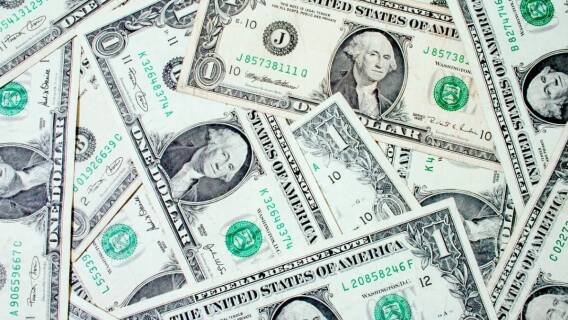Congress just approved a $1.9 trillion stimulus package. The money will flood into the economy in the next several months. As a result, certain stocks will see a huge benefit. But which stocks will benefit most from the $1.9 trillion stimulus?
Who says politicians don’t do anything? Nonsense—they spend. Politicians are better than any other group of people in the history of civilization at spending money. Let’s be fair.
We’ve become numb to terms like billions and trillions. But it’s worth a brief mention of how massive these numbers actually are. To illustrate, let’s measure these numbers in a way we can more easily understand, and apply them to increments of time.
Let’s start with a billion (also know as government chump-change). A billion seconds is 31.5 years. A billion seconds ago it was still 1989. A billion minutes ago was around the time of Christ. A trillion seconds is 31,688 years. A trillion minutes is 1.9 million years.
[text_ad]
Congress just approved spending an amount of dollars, which if measured in mere seconds, would be 60,000 years. That’s a lot of bread.
Of course, massive spending bills aren’t new to this pandemic. The CARES Act, which was passed last year during the thick of the pandemic and lockdowns, was $2.2 trillion. And still more stimulus was approved after that. This $1.9 trillion thing is just the latest stratospheric quantity of dollars the government is spending over the last year.
But there’s a difference with this one. Previous stimulus mostly compensated for dollars that came out of the economy as a result of the lockdowns. They mitigated damage caused by the economic crash. This $1.9 trillion will hit an economy that is already rapidly recovering and growing.
Of course, certain business owners and individuals need that money and more. They didn’t shut down the economy. But it’s been severely impacted. As the vaccines end the remaining lockdowns and restrictions, a full economic recovery will be unleashed. And much of this $1.9 trillion will just be extra, in terms of the aggregate economy.
The new bill includes $1,400 in direct payments to most Americans. It also provides $300 per month in supplemental unemployment benefits, roughly $40 billion for businesses, and $350 billion for state and local governments. The rest of the $1.9 trillion will go somewhere else.
All those dollars floating around will wind up somewhere. Let’s examine which industries and companies will likely benefit the most from the windfall.
Which Stocks Will Benefit Most from the $1.9 Trillion Stimulus?
Retail
There will be an estimated $410 billion in direct payments to individuals in March and mostly April. While many will need that money just to stay afloat after losing jobs and businesses, the current aggregate savings rate among U.S. households is estimated to be a historically healthy 20.5%.
Much of the money will surely find its way to consumption. A population flush with cash will likely benefit retail stores like Target (TGT), Walmart (WMT), Best Buy (BBY) and The Home Depot (HD).
Real Assets
Actual material things are great to own during times of inflation, as it takes more dollars to buy the same thing. Of course, we haven’t seen any meaningful inflation in a long time. Historically, low interest rates and lots of extra dollars cause inflation. But that hasn’t been the case in recent years.
That said, a booming economy along with stimulus dollars should increase the amount of money floating around with a similar amount of real assets. There has to be some inflation. Commodities and real assets will likely appreciate.
The situation should be good for real estate prices and REITs. The Vanguard Real Estate Index Fund ETF (VNQ) is an easy way to play the trend. You can also target industry stalwarts and long-time stars like Realty Income (O).
The price of oil should also rise. In fact, it’s soaring already. Companies like Chevron (CVX) and refiners like Valero Energy (VLO) should benefit along with many others. The current dynamic should also benefit basic materials in general (iron ore, lumber, precious metals and agriculture). The iShares U.S. Basic Materials ETF (IYM) is a good way to play the general trend.
Financial Companies
Perhaps the biggest winner will be financial companies and stocks, many of which are still price below pre-pandemic levels. Interest rates are already rising, and economic growth and trillions in stimulus will certain apply more upward pressure to longer-term interest rates. Many financial companies (like banks and other lenders) benefit from rising interest rates, as the loan spreads they earn increase.
The environment should benefit banks like JPMorgan (JPM) and U.S. Bancorp (USB), among others. These financial stocks are already hot and there should be a lot more left in the tank in the months ahead.
The stimulus should also be great for the stock market and companies that benefit. As a result of the stimulus, Goldman Sachs raised the household equity demand forecast from $100 billion to $350 billion. Household money has already been flowing into the market and the stimulus should really open the spigot in the months ahead. It should be a huge boon to asset managers and brokerage firms, along with big banks.
Some argue that rising interest rates (a likely occurrence) is bad for stocks. But that has not been the case. Since 1990, the S&P 500 has averaged a 14.2% return in years when rates were rising and only 6.4% in years of falling rates.
A $1.9 trillion stimulus will hit a soon-to-be booming economy at times of still-low interest rates. That is a Christmas morning scenario for stocks. Come and get yours.
[author_ad]

